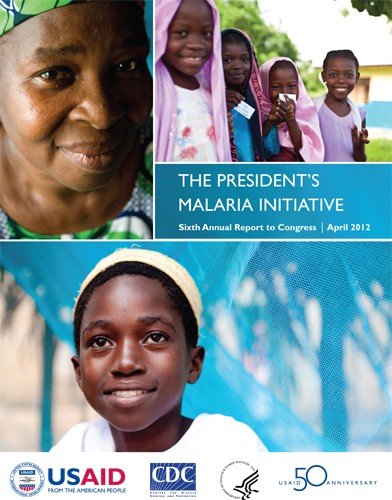
For Immediate Release
WASHINGTON, D.C. - Each year, World Malaria Day is observed to call attention to the disease and to mobilize action to combat it. On this occasion, the President's Malaria Initiative (PMI), led by the U.S. Agency for International Development (USAID) and implemented together with the Centers for Disease Control and Prevention (CDC), releases its sixth annual report which describes the role and contributions of the U.S. Government in the effort to reduce the burden of malaria in Africa, and to monitor antimalarial drug resistance and decrease malaria transmission in the Greater Mekong Subregion.
Progress against malaria is one of development's most impressive stories. According to the World Health Organization (WHO) 2011 World Malaria Report, the estimated number of global malaria deaths fell from about 985,000 in 2000 to about 655,000 in 2010.
"We are seeing the impact of malaria control efforts by the U.S. and other partners in Africa," said Rear Adm. Tim Ziemer, U.S. Global Malaria Coordinator. "Now we are working to sustain these gains, focusing on early diagnosis and treatment of malaria, as well as effective prevention interventions. By training health workers, educating communities, and ensuring that drugs and supplies are available where they are needed, we can beat malaria."
PMI is a major component of the U.S. Government's Global Health Initiative (GHI), announced by President Barack Obama in May 2009. The initiative was launched in June 2005 by President George W. Bush to reduce the intolerable burden of malaria and help relieve poverty on the African continent.
Partnerships with national governments, the Global Fund to Fight AIDS, Tuberculosis and Malaria, the World Bank Booster Program for Malaria Control, other multilateral and bilateral organizations, foundations, and a multitude of non-governmental organizations and community and faith groups make this possible. PMI, in collaboration with partners, has reached many millions of people in sub-Saharan Africa with life-saving prevention and treatment measures through a variety of approaches that extend to the community level.
PMI is working in 19 focus countries in Africa and one regional program in the Greater Mekong Subregion of southeast Asia. Guinea and Zimbabwe were added in 2011 and PMI expanded its geographic scope in Nigeria and Democratic Republic of Congo. In all eleven of the PMI focus countries where baseline and follow-up nationwide household surveys have been conducted (Angola, Ethiopia, Ghana, Kenya, Madagascar, Malawi, Rwanda, Senegal, Tanzania, Uganda and Zambia), mortality in children under the age of five has dropped, with reductions ranging from 16 percent (Malawi) to 50 percent (Rwanda). While multiple factors are undoubtedly influencing this decline, growing evidence suggests that malaria prevention and treatment are playing a major role in these unprecedented reductions in under-five mortality.
In spite of this progress, malaria remains one of the greatest threats to public health. In Africa, about 80 percent of malaria deaths occur in children under five years of age. Malaria casts a shadow not only over health, but also on educational achievement, worker productivity, and economic development. The total household cost of an adult case of malaria is estimated to be about $13. On average, a malaria infection costs a family more than three days of lost productivity. Economists estimate that malaria accounts for approximately 40 percent of public health expenditures in some countries in Africa.
Fighting malaria is a key part of the collective effort to end preventable child deaths. Check out the global campaign to help get more kids safely past five -- Every Child Deserves a 5th Birthday. Post your photo 5thBDay.usaid.gov.







Comment
Make a general inquiry or suggest an improvement.